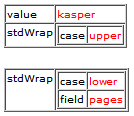Attention
TYPO3 v7 has reached its end-of-life November 30th, 2018 and is not maintained by the community anymore. Looking for a stable version? Use the version switch on the top left.
There is no further ELTS support. It is recommended that you upgrade your project and use a supported version of TYPO3.
General information¶
PHP information¶
The content objects (data type: cObject) are primarily controlled by the PHP- script "typo3/sysext/frontend/Classes/ContentObject/ContentObjectRenderer.php". The PHP-class is named "ContentObjectRenderer" and often this is also the variable-name of the objects ($cObj).
The $cObj in PHP has an array, $this->data, which holds records of various kind. See data type "getText".
This record is normally "loaded" with the record from a table depending on the situation. Say if you are creating a menu it's often loaded with the page-record of the actual menu item or if it's about content-rendering it will be the content-record.
REUSING cOBJECTS¶
When dealing with "cObjects", you're allowed to use a special syntax in order to reuse cObjects without actually creating a copy. This has the advantage of minimizing the size of the cached template. But on the other hand it does not give you the flexibility of overriding values.
This example will show you how it works:
#
# Temporary objects are defined:
#
lib.stdheader = COA
lib.stdheader {
stdWrap.wrapAlign.field = header_position
stdWrap.typolink.parameter.field = header_link
stdWrap.fieldRequired = header
1 = TEXT
1.stdWrap.current = 1
1.stdWrap.fontTag = {$content.wrap.header1}
stdWrap.space = {$content.headerSpace}
}
#
# CType: header
#
tt_content.header = COA
tt_content.header {
10 < lib.stdheader
10.stdWrap.space >
20 = TEXT
20.stdWrap.field = subheader
20.stdWrap.fontTag = {$content.wrap.subheader1}
}
#
# CType: bullet
#
tt_content.bullets = COA
tt_content.bullets {
10 = < lib.stdheader
20 < styles.content.bulletlist_gr
}
First lib.stdheader is defined. This is (and must be) a cObject! (In this case it is COA.)
Now lib.stdheader is copied to tt_content.header.10 with the "<" operator. This means that an actual copy of lib.stdheader is created at parsetime.
But this is not the case with tt_content.bullets.10. Here lib.stdheader is just pointed to and lib.stdheader will be used as the cObject at runtime.
The reason why lib.stdheader was copied in the first case is the fact that it's needed to unset ".stdWrap.space" inside the cObject ("10.stdWrap.space >"). This could not be done in the second case where only a pointer is created.
Note:¶
If lib.stdheader was temp.stdheader instead, the pointer would not work! This is due to the fact that the runtime-reference would find nothing in "temp." as this is unset before the template is stored in cache!
This goes for "temp." and "styles." (see the top-level object definition elsewhere).
Overriding values anyway:
Although you cannot override values TypoScript-style (using the operators and all) the properties of the object which has the reference will be merged with the configuration of the reference.
Example:¶
page.10 = TEXT
page.10.value = kasper
page.10.stdWrap.case = upper
page.20 = < page.10
page.20.stdWrap.case = lower
page.20.value >
page.20.stdWrap.field = pages
The result is this configuration:

Notice that .value was not cleared, because it's simply two arrays which are joined:

So hence the line page.20.value > in the above example is useless.
